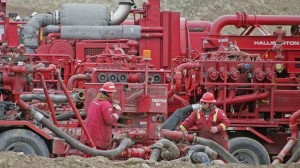Center For Sustainable Shale Development Certifies Fourth Appalachian NatGas Producer
From an Article by Jamison Cockling, NGI Shale Daily, April 19, 2016
The Pittsburgh-based Center for Sustainable Shale Development (CSSD) said Monday that it has issued its fourth certification to EQT Corp., confirming that the company’s Appalachian Basin operations are in compliance with its 15 performance standards for oil and natural gas development in the region.
EQT’s certification is now valid for two years. It demonstrates that the company’s operations either meet or exceed a set standards that were established by state regulators and industry participants when the CSSD was formed.
“EQT Corp. is now the fourth major operator in the Appalachian Basin to demonstrate it meets CSSD’s 15 performance standards,” said Executive Director Susan LeGros. “In each of these 15 areas, EQT’S Appalachian Basin operations meet or exceed state and federal air and water management regulatory requirements. EQT’s certification, and the other operators who have qualified for certification and continue to maintain conformance to CSSD’s standards, reinforces the importance and value of responsible voluntary actions and transparency that goes beyond simple compliance.”
During the two-year certification, CSSD continually monitors the companies for compliance and they are subject to at least one assurance audit to make sure compliance with the standards is maintained. The CSSD, for example, requires green completion equipment and more efficient flaring systems.
The evaluation and verification process for EQT was conducted by the audit firm Bureau Veritas. The firm conducted a pre-audit to determine if the company was prepared for the process. In July 2015, the full-scale audit began with document reviews, staff interviews and field inspections. Bureau Veritas visited 18 of the company’s active operating sites in the region.
After the audit was completed, a report was sent to CSSD, whose certification committee determined eligibility. None of the committee members were affiliated with the company.
EQT has been operating in the basin for more than 125 years. It owns 3.4 million gross acres, including 630,000 in the Marcellus Shale. It produced 603.1 Bcfe in 2015 and was Pennsylvania’s fifth largest gas producer last year.
Consol Energy Inc. was certified by the CSSD in April 2015 just after Royal Dutch Shell plc’s operations were fully certified in March 2015. Chevron Appalachia LLC was the first to be certified by the center in September 2014. CSSD also said Tuesday that all three of those companies had successfully completed assurance audits to maintain their certifications.
The CSSD was established in early 2013. It brought together environmental organizations and energy companies to ensure that shale gas resources are safely developed in the basin. Industry participants include Chevron, Consol, Shell and EQT. It’s unclear if the CSSD is working to certify any non-participating producers. The center does not comment about pending applications until they are approved and announced.
The Clean Air Task Force, the Environmental Defense Fund and the Pennsylvania Environmental Council are also among the center’s partners.
See also: www.FrackCheckWV.net


{ 2 comments… read them below or add one }
Range Resources exec apologizes for remark about drilling locations
From an Article by Anya Litvak, Pittsburgh Post-Gazette, April 23, 2016
Terry Bossert, a Range Resources Corp. executive whose remarks at an Environmental Law Form earlier this month caused a stir and raised questions about how the company selects its well locations, has written an open letter titled “A Driller’s apology.”
In it, the vice president of legislative and regulatory affairs apologized for his “attempt to interject dry sarcasm” into a presentation on oil and gas well siting. Several attorneys in the audience said Mr. Bossert indicated the company avoids placing wells near big homes where residents have enough money to fight the process.
Patrick Grenter, an attorney at the Center for Coalfield Justice in Washington, Pa., who attended the Pennsylvania Bar Institute event in Harrisburg and said he was the first to challenge Mr. Bossert after the presentation, isn’t buying the sarcasm angle.
“There was no ambiguity to his words at all,” Mr. Grenter said after reading the apology letter. “There was no joke. This was a remarkable statement in an otherwise unremarkable presentation.”
The Center for Coalfield Justice and several other environmental groups used the occasion of Mr. Bossert’s statement on well siting to urge the PA Department of Environmental Protection to examine if there is environmental injustice in oil and gas siting decisions.
Mr. Bossert, who served as PA DEP’s chief counsel in the 1990s, reiterated in his letter on Thursday that Texas-based Range looks at a host of factors, including topography, geology, lease terms and zoning, when deciding where to build a well pad.
“It is unfortunate that my poor choice of words could call into question the unwavering commitment we have at Range in working with residents regardless of their economic means,” it stated. A Range spokesman declined to comment further.
Logan Welde, an attorney with the Clean Air Council who was present at Mr. Bossert’s talk on April 6, said he wasn’t surprised by the sentiment of the comments, even if hearing them out loud was jarring. Private companies regularly weigh “potential pitfalls” in their pursuit of success, he said.
“Avoiding potential and costly conflict is one of those,” he said. “One of the criteria in the analysis is likely what sort of opposition they’re going to face and if they can minimize it.” Nor is this unique to Range or oil and gas companies in general, Mr. Welde said. The burden of industrial activity always tends to fall disproportionately on communities with fewer resources, he said.
“This maybe even shouldn’t be about Terry Bossert’s comments,” he said. “Maybe the bigger story should be where is the PA-DEP and Pennsylvania Legislature in protecting these communities.”
NONSENSE ……………….
There’s no such thing as sustainable shale development. What a crock!